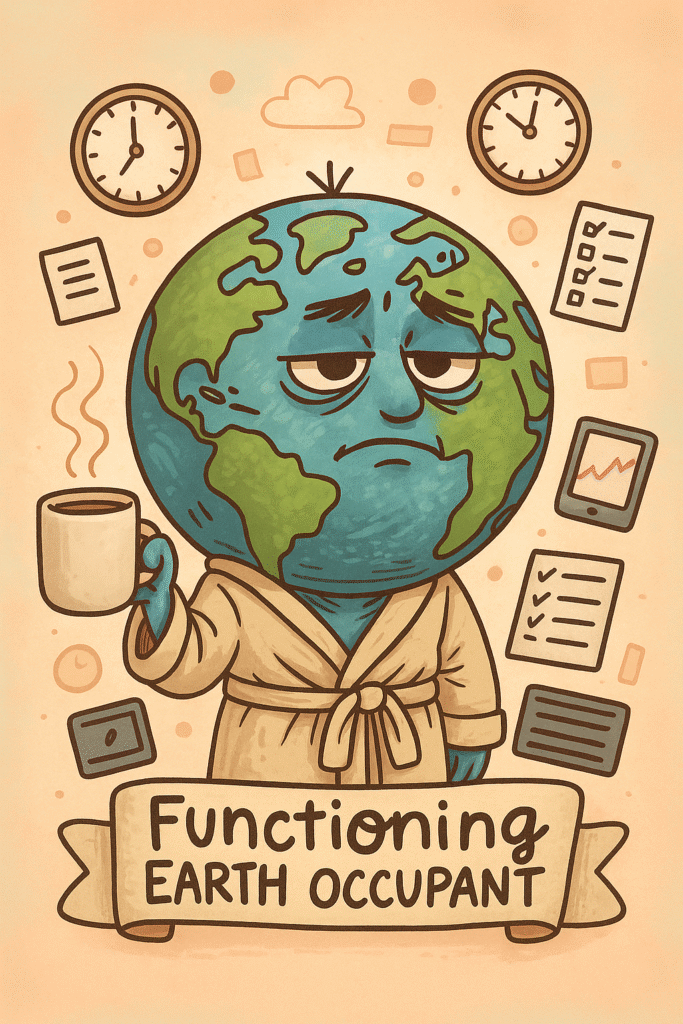
I’ve had those nights where “bedtime” means scrolling through whatever, a podcast playing in the background, maybe even a little solo recreation to feel something, if you catch my drift.
It’s not just about the entertainment. It’s the only time the house is quiet, when no one needs anything, and you finally get to just be alone.
But you pay for it the next day. You wake up and need thirty minutes just to defrost before getting out of bed, then you’re looking at your tired face in the mirror while brushing your teeth. You commute to work feeling like bleh. Eventually your brain kicks in and you start to feel okay… until you don’t.
Then comes the guilt. That creeping feeling like you’re falling behind in life. You start picking yourself apart. You feel lazy. You question your decisions. Everything feels heavier and more dramatic than it really is.
Your thoughts turn against you for no good reason. Great. Back to being a passenger in your own head.
Damn vicious cycle.
But here’s the thing, a lot of that isn’t deep or personal. It’s not some lifelong flaw. Most of it is just sleep deprivation messing with your mind.
So if your sleep’s been wrecked and your brain’s been turning against you lately, here’s what actually helps.
You don’t need some 10-step ritual or monk-level discipline. Just a few simple changes that shift you back to being a functioning Earth occupant.
Let’s get into it.
7 Practical Ways to Reset Your Sleep Schedule
1. Do not nap after work
Listen. I know the urge. You come home from work, crash on the sofa or bed, and it feels amazing. Until you wake up at 7 or 8 p.m. with a dry mouth and a headache, completely disoriented.
Then… surprise.
You can’t sleep at night. Again.
So rule number one: do not nap. At least not while you’re trying to fix your sleep schedule. Save the naps for when your rhythm is back on track.
2. Redefine what “tired” means
A lot of people think they’re not tired just because they can physically stay up. That’s the wrong approach. You don’t need to be on the verge of passing out to decide it’s time for bed.
Start winding down when you feel mentally drowsy. That quiet heaviness in your mind, not just your body. If you wait until total exhaustion, you’ve already missed the window.
3. Get more sunlight
Step outside within the first hour of waking. Natural light signals to your brain that it’s daytime and helps regulate your sleep-wake cycle.
Well, that’s what they say anyway. I don’t actually know the science behind it, but I try to do it just in case it works.
4. Keep the room dark
Reduce light as much as possible. Turn off small lights, close your curtains, or use a sleep mask. They say light messes with melatonin more than people realise.
Again, that’s what they say. I just do it anyway.
5. Shift bedtime gradually
If you’ve been sleeping at 3 a.m., don’t try to suddenly sleep at 10 p.m. Move your bedtime earlier by 30–60 minutes every few nights. Let your body adjust slowly.
6. Wake up at the same time everyday
Even after a bad night. Getting up at the same time helps reset your internal clock faster than anything else.
If you sleep late and then wake up late on your day off, you’ve just broken the rhythm you were trying to build. Keep the wake-up time fixed, no matter how rough the night was.
7. Use visualisation to relax
If your mind refuses to chill out when it’s time to sleep, try this simple mental trick. It actually helped me when nothing else did. You can also find similar material on YouTube, listening can help.
- Slowly breathe out and close your eyes
- Imagine your eyelids are sealed shut and can’t open
- Almost try to open them without actually doing it
- Picture yourself standing at the top of a staircase with ten steps
- Look down and sense how that feels, the space, the quiet, the distance
- Start walking down the steps slowly
- With each step, let yourself sink deeper into relaxation
- Focus on the feeling in your legs as you walk
- Notice the sound your feet makes with each step
- No need to rush. Just let yourself drift
You’ll notice I haven’t mentioned caffeine, blue light filters, or supplements. That’s intentional. If you’re not even sleeping properly to begin with, there’s no point obsessing over sleep quality hacks. First, just focus on getting to bed and waking up at the right times. The quality part tends to sort itself out once your rhythm is back.
More articles coming soon at earthoccupant.com.